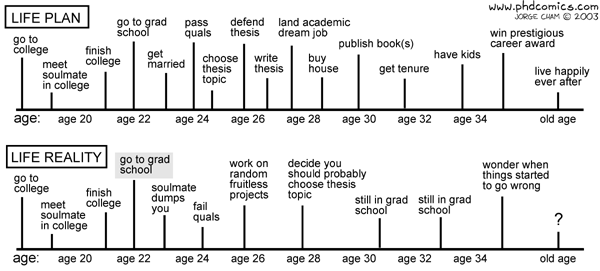"One of my first memories is myself, 5 years old, going to my mother and declare to her, as serious as only children can be: “I will be a scientist.”
Yesterday night I was in my office in the Department of Chemistry at the University of Cambridge packing my stuff, resolved to not go back to research again -at least not in the shortcoming future.What has gone wrong?

...
Every scientist goes on to do science for a single reason: the love of science. Science doesn’t make you rich, it doesn’t make you famous (can you tell me the last 5 Nobel Prizes for chemistry without looking on Wikipedia? I can’t either) and doesn’t make you comfortable. The only sane reason for starting to do science is the dispassionate love of science itself. And I loved science. Like nothing else. Since I was 5 years old. And I still love it.
But one thing is to love science; a completely different one is doing it. Like the proverbial sausage, you don’t want to know how it’s done.
Actually, doing science per se is great. Doing experiments, analyzing data, making calculations, programming code: I loved it all immensely.
However, with the partial exception of mathematics and theoretical physics, you can’t be a lone wolf in science. You need funding, you need instruments, you need resources. You need other people. And here’s where the problems lie. You basically face two choices.
The first is going for the sky: doing great science in a first-class place, make a great curriculum and look for a tenured position in the end. The problem is that a lot of clever people want to go for the sky, and there is much more people who want the sky compared to the available positions. In general, science career is a race, where three people go to the podium and all the others sooner or later will go back home. The competition for funding and positions means that not only the hopes of getting a job are really lousy, but that people become nasty. Like, really nasty.
...It’s not all, of course. Top level science requires also an absolutely mind-boggling determination and, overall, confidence in yourself. To properly do science you must be absolutely sure that, whatever you have in mind, you will do it, no matter what, and that you’re doing it right, to the point of almost self-delusion.... Combined with the above, this means working 24/7, basically leaving behind everything in your life, without any doubt on your skills and abilities and most importantly on your project, while fencing off a competition of equally tough, confident and skilled guys.
....
So basically, if you are not cut for this kind of life, your chances are zero. I tried, believe me. I tried hard. What happened during my research career is that I spent 6 months on antidepressants, I got a permanent gastritis, I wasted at least two important sentimental relationships, and I found all my interests and social life going down the drain.
All of this for having a couple papers about modeling obscure aspects of protein behaviour, papers that will be probably lost within the literally thousands of papers that come out every day? Until not so long, I thought that it was worth it. It was something that I had never questioned so far. I wanted to be a scientist since when I was five. I had done everything to become a scientist. I was a scientist in one of the top universities of the world, in one of the top five research groups on the subject. I had won a personal fellowship to fund myself. Most of my self-esteem, of my very concept of self-realization, relied on myself being a scientist. The very idea of quitting academia was a synonim of personal failure.
It has been long and painful to discover that it was just an illusion. When I found that academia was not working for me, I got immediately depressed -my whole worldview was crumbling.
... A week ago I was with friends, talking about my job, and I found myself comparing science to a drug addiction. Being a scientist, from the brain chemicals point of view, is one week of adrenaline rush when you’re finally on to something and pieces go together -followed by six months (if you are lucky) of pain and suffering, only to get again that adrenaline shot.
Well, noble addiction as it is, it is toxic the same. The next month I’ll be 30. It’s really time to get my life back.
Daqui Blog
Faço estas as minhas palavras. Do porquê da "crise existencial", do porquê de querer mudar de vida e do porquê de ainda continuar aqui...


0 comentários:
Enviar um comentário